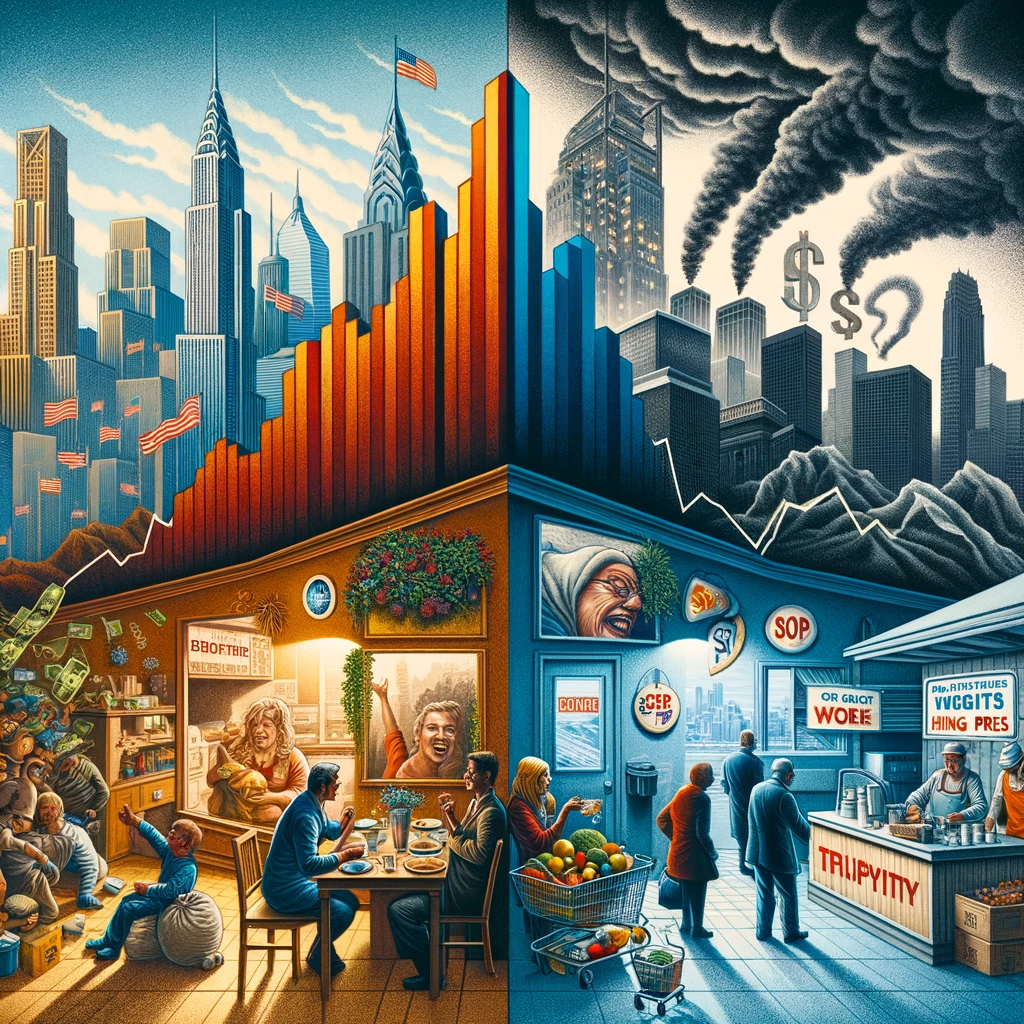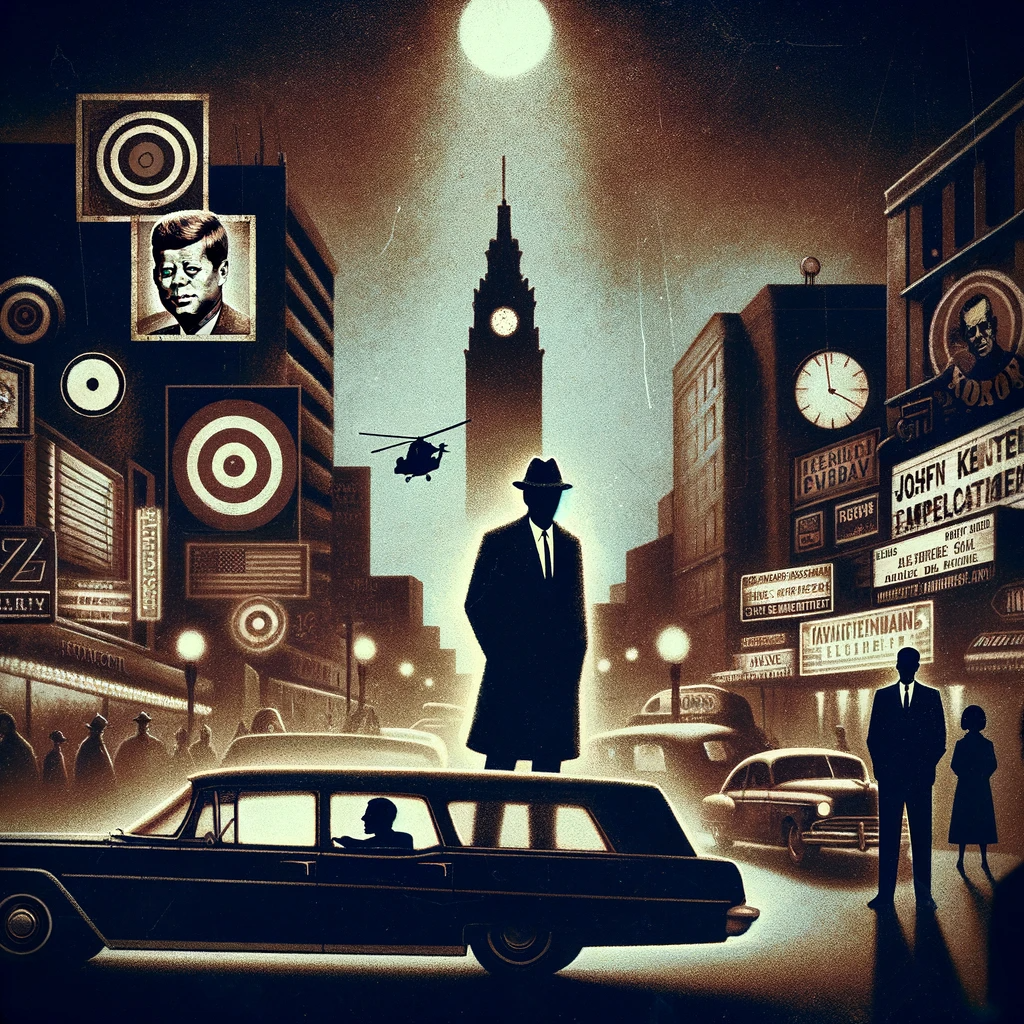
The American Dichotomy: Prosperity's Shadow in the Land of the Free
November, 2023
In the grand tapestry of the American economy, there exists a
dichotomy so stark it could have been ripped from the pages of a
novel. The economy, by certain metrics, appears to be
flourishing. Yet, there is a pervasive sentiment that paints a picture
of an America in distress, a nation where the cost of living has
soared beyond the reach of the common man.
Let me tell you, the price of existence has indeed surged. Rent,
new cars, gas, utilities, and food have climbed to heights that would
have seemed insurmountable just three years ago. The average family, a
unit of four perhaps, grapples with the relentless tide of rising
interest rates, the gnawing fear of job loss, and the erosion of their
purchasing power as inflation devours their modest grocery budget.
The reality of the situation is not confined to the abstract
realm of economic indicators; it is etched in the furrowed brows of
those who find themselves on the brink of financial ruin. For many,
an unexpected bill of $500 is a catastrophe waiting to happen, a
stark reminder of the paycheck-to-paycheck existence that has become
the norm rather than the exception.
The narrative that the economy is robust is a half-truth at
best. It is a narrative that fails to acknowledge the lived
experiences of countless individuals. The numbers may tell a tale of
stability, but they do not reflect the silent struggles of those who
have seen their salaries stagnate while their cost of living has
ballooned.
The dissonance between the statistical portrayal of economic
health and the palpable anxiety of the populace cannot be dismissed
as mere exaggeration. There is a tangible disconnect between the
ivory towers of high society and the reality on the ground. It is a
disconnect that breeds disillusionment and fosters a sense of
abandonment.
The technocrats may tout the resilience of the economy, but they
do so from a position of privilege that blinds them to the everyday
hardships faced by the masses. The narrative of prosperity is a
bitter pill to swallow for those who find themselves choosing
between filling their gas tanks and filling their pantries.
The truth is, the American economy is a complex beast, one that
cannot be tamed by optimistic projections or rosy retrospectives. It
is an entity that is as susceptible to the whims of global forces as
it is to the internal machinations of policy and governance.
As an observer of this unfolding drama, I am compelled to
acknowledge the disquieting reality that for many, the American
Dream has become an American struggle. It is a struggle that is not
captured by the cold calculus of economic models or the detached
analysis of pundits.
The economy may be doing "amazingly well" for some, but for
others, it is a daily battle to stay afloat. It is a battle that is
fought in the grocery aisles, at the gas pumps, and in the quiet
desperation of living rooms across the nation. It is a battle that
deserves to be recognized, not dismissed with a wave of the hand or
a turn of phrase.
In the end, the state of the economy is a tale of two Americas: one
that thrives and one that strives. It is a tale that demands our
attention, our empathy, and our action. For in the end, the true
measure of an economy is not found in the abstract, but in the
well-being of its people.

Shadow of a Hitman: Unraveling Charles Harrelson's Alleged Role in the JFK Assassination
November, 2023
In the dim light of history, the assassination of John F. Kennedy
remains a subject of deep intrigue and unresolved mystery. It is a
story that has been told and retold, each time with new characters and
conspiracies stepping out from the shadows. Among the many narratives,
one that has recently come to my attention is the alleged involvement
of a man named Charles Harrelson, a professional hitman and father to
actor Woody Harrelson.
Charles Harrelson was a man of lethal talents, a hitman with a
military background who, it is said, was recruited by the CIA and
later found employment with the Carlos Marcello mob. His life was a
tapestry of violence and secrecy, and it ended behind the bars of a
maximum security prison, where he served time for the murder of a
federal judge. But it is his purported confession, one that he is said
to have shared with his son Woody, that stirs the pot of historical
speculation.
This confession, if true, would be a piece of the puzzle that has
eluded historians and investigators for decades. It is a claim that
suggests a direct link between the underworld of organized crime, the
clandestine operations of the CIA, and the tragic day in Dallas that
saw a president fall and a nation forever changed.
The implications of such a connection are profound. They suggest a
treachery within the ranks of our own government, a sedition that
undermines the very foundations of our democracy. It raises questions
about the complicity of the FBI and the Secret Service, agencies that
are supposed to protect our leaders and uphold the law. What does it
say about our country if these institutions were, in fact, part of a
conspiracy to assassinate a sitting president?
The story of Charles Harrelson is not just a footnote in the annals
of crime; it is a thread in the tapestry of American history that,
when pulled, unravels a narrative we thought we knew. It is a
revelation that forces us to reconsider the events of November 22,
1963, and to ask ourselves what other truths might be lurking in the
shadows, waiting to be uncovered.
As I ponder these revelations, I am reminded of the power of
storytelling and the weight of history. The tales we tell ourselves
about our past shape our understanding of the present and our
expectations for the future. They can be a source of national pride or
a cause for collective soul-searching. In the case of JFK's
assassination, the story is far from over, and the search for truth
continues.
It is a search that has taken many forms over the years, from
official investigations to documentaries that disturb and
documentaries that seek to rewrite history. It has inspired works of
fiction, like the book "No Country for Old Men," where a reference to
the murder of a judge echoes the real-life story of Charles
Harrelson. It has even found its way into popular culture, with Woody
Harrelson himself starring in an HBO mini-series that asks, "Who
really killed JFK?"
The quest for answers is not just an academic exercise; it is a
moral imperative. We owe it to ourselves and to future generations to
confront the dark chapters of our history with honesty and courage. We
must be willing to face the possibility that the story we have been
told is not the whole truth, and that there are still secrets waiting
to be revealed.
As for Woody Harrelson, the son of a convicted killer and a man
caught in the crosshairs of history, one can only imagine the weight
of his father's legacy. What does he believe about the role his father
may have played in one of the most pivotal moments of the 20th
century? Does he hold the key to a mystery that has haunted us for
sixty years?
The answers to these questions may never be fully known, but the
search for truth must go on. It is a search that defines us as a
nation and as a people, a search that reminds us that history is not
just a record of the past, but a living, breathing presence that
shapes our lives in ways we may never fully understand.

